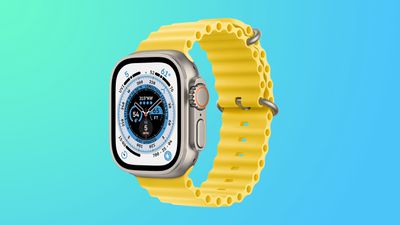Apple has been selling the Apple Watch Series 9 and Apple Watch Ultra 2 without the blood oxygen monitoring feature in the U.S. since mid-January, and while we’ve suspected Apple would be able to reintroduce pulse oximetry in models that lack it through a future software update, new information from the U.S. Customs and Border Protection (CBP) confirms that reactivation is indeed a possibility. As a recap, Apple was found to be infringing on patented pulse oximetry technology owned by Masimo, and was banned from importing the Apple Watch Series 9 and Ultra 2 into the U.S.
The original January 12 order from CBP that allowed Apple to bring Apple Watch models with a disabled sensor in the United States was published recently (via ip fray), and it gives some insight into how Apple disabled pulse oximetry. While some of the order is redacted, Apple implemented a fix that turns off pulse oximetry when an Apple Watch is paired to an iPhone. Blood oxygen sensing becomes inaccessible to the user, and opening the blood oxygen app gives a warning that the feature is not available. Apple said that it hardcoded each Apple Watch at the factory with new software.
As part of the process to get approval to sell Apple Watch Series 9 and Ultra 2 models without pulse oximetry enabled, Apple had to provide the code disabling the feature and test devices to Masimo. Masimo didn’t want Apple to have such an easy fix, so it paired the “redesigned” Apple Watches with a jailbroken iPhone running an older version of iOS, and was able to get pulse oximetry working.
Masimo tried to argue that activating pulse oximetry through a jailbroken phone meant Apple had not effectively removed the feature and the devices should not be allowed to be imported in to the U.S. Masimo also tried to say that jailbreaking is “permissible, common, and readily known,” but Masimo’s arguments were unsuccessful. The Exclusion Order Enforcement Branch of the U.S. Customs and Border Patrol ultimately decided that disabling pulse oximetry in the Apple Watch Series 9 and Ultra 2 was enough to avoid infringing on Masimo patents, allowing those models to be offered for sale at Apple retail stores in the U.S.
Because Masimo was able to get blood oxygen sensing working using software on a jailbroken iPhone, Apple too would be able to reactivate the blood oxygen sensor in the models where it has been disabled through a software update. When no longer subject to an import ban, Apple will be able to reintroduce blood oxygen sensing for Apple Watch Series 9 and Apple Watch Ultra 2 users who are not able to access the feature.
As noted by ip fray, the patents that Apple was found to have infringed on expire in August of 2028, which means that Apple will be able to re-enable pulse oximetry in affected models at that time. Apple filed an appeal with the United States International Trade Commission to attempt to get the ruling overturned, so if the appeal is successful, Apple could be able to re-add blood oxygen sensing sooner.
Apple could also opt to settle with Masimo and work out a licensing deal, but at this point, it doesn’t sound like that is going to happen. Masimo CEO Joe Kiani said in January that he had not spoken with Apple, and while he would be open to settling, an apology and an “honest dialogue” would need to be part of any settlement discussion.
Kiani has maligned the Apple Watch blood oxygen sensor several times, saying that customers are “better off without” the feature because it is not a “reliable, medical pulse oximeter.”
The Apple Watch Series 9 and Ultra 2 only have disabled blood oxygen sensing capabilities in the United States, as the ban is not applicable in other countries. The Apple Watches remain fully functional outside of the U.S.




